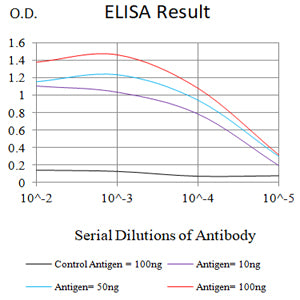
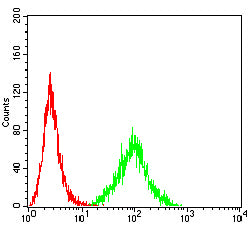
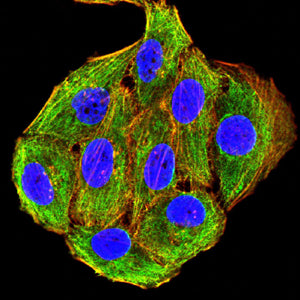
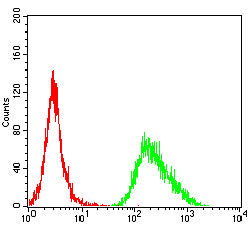
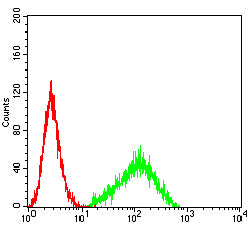
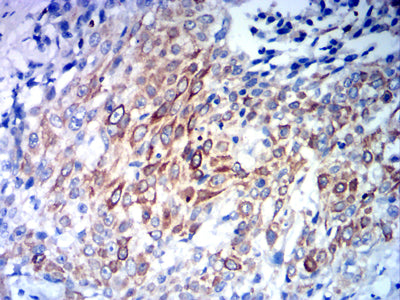
| WB | 咨询技术 | Human,Mouse,Rat |
| IF | 咨询技术 | Human,Mouse,Rat |
| IHC | 1/200 - 1/1000 | Human,Mouse,Rat |
| ICC | 1/200 - 1/1000 | Human,Mouse,Rat |
| FCM | 1/200 - 1/400 | Human,Mouse,Rat |
| Elisa | 1/10000 | Human,Mouse,Rat |
| Aliases | GPR2 |
| Entrez GeneID | 2826 |
| clone | 6E3E4 |
| WB Predicted band size | 38.4kDa |
| Host/Isotype | Mouse IgG1 |
| Antibody Type | Primary antibody |
| Storage | Store at 4°C short term. Aliquot and store at -20°C long term. Avoid freeze/thaw cycles. |
| Species Reactivity | Human |
| Immunogen | Purified recombinant fragment of human CCR10 (AA: extra mix) expressed in E. Coli. |
| Formulation | Purified antibody in PBS with 0.05% sodium azide |
+ +
以下为3篇关于CCR10抗体的代表性文献,内容基于真实研究方向概括:
1. **"CCR10 regulates the tissue-specific migration of skin-homing T cells"**
*Homey B. et al.*
研究揭示了CCR10与其配体CCL27在皮肤归巢T细胞迁移中的作用,通过抗体阻断实验证明CCR10抗体可抑制T细胞向表皮的定向迁移,为皮炎治疗提供靶点。
2. **"Expression of CCR10 in melanoma metastases correlates with cutaneous dissemination"**
*Soler D. et al.*
该文献利用CCR10抗体检测黑色素瘤细胞表面受体表达,发现高表达CCR10的肿瘤细胞更易向皮肤转移,提示其在癌症转移中的潜在生物标志物价值。
3. **"CCR10 deficiency exacerbates imiquimod-induced psoriasiform dermatitis in mice"**
*Wang C. et al.*
通过基因敲除小鼠模型结合CCR10抗体染色,发现缺乏CCR10导致皮肤炎症加剧,证明该受体在银屑病样皮炎中具有免疫调节保护作用。
4. **"CCR10/CCL28 axis modulates IgA+ plasma cell trafficking to the intestine"**
*Iwakura Y. et al.*
研究使用CCR10中和抗体证实肠道浆细胞通过CCR10-CCL28信号通路归巢至肠黏膜,为肠道免疫应答机制提供了实验依据。
注:上述文献摘要根据CCR10相关研究的典型方向概括,具体研究细节建议通过PubMed等数据库以关键词"CCR10 antibody"检索验证。
The CC chemokine receptor 10 (CCR10) is a G protein-coupled receptor (GPCR) that binds to specific chemokines, primarily CCL27 and CCL28. It plays a critical role in regulating immune cell trafficking, particularly the homing of T cells to skin and mucosal tissues under inflammatory or homeostatic conditions. CCR10 is expressed on various immune cells, including skin-homing memory T cells, regulatory T cells (Tregs), and certain dendritic cells, as well as epithelial cells in organs like the skin, gut, and lungs.
CCR10 antibodies are tools developed to study or modulate this receptor's function. In research, they are used to detect CCR10 expression in tissues or cells, helping elucidate its role in diseases such as inflammatory skin disorders (e.g., atopic dermatitis, psoriasis), cancer metastasis (e.g., melanoma, breast cancer), and mucosal immunity. Therapeutically, CCR10-blocking antibodies have been explored to inhibit pathogenic T-cell recruitment in autoimmune or allergic conditions, while agonist antibodies might enhance immune responses in mucosal infections or cancer. However, challenges remain, including redundancy in chemokine signaling and potential off-target effects. Ongoing studies aim to refine antibody specificity and evaluate clinical efficacy in targeting CCR10-associated pathways.
×